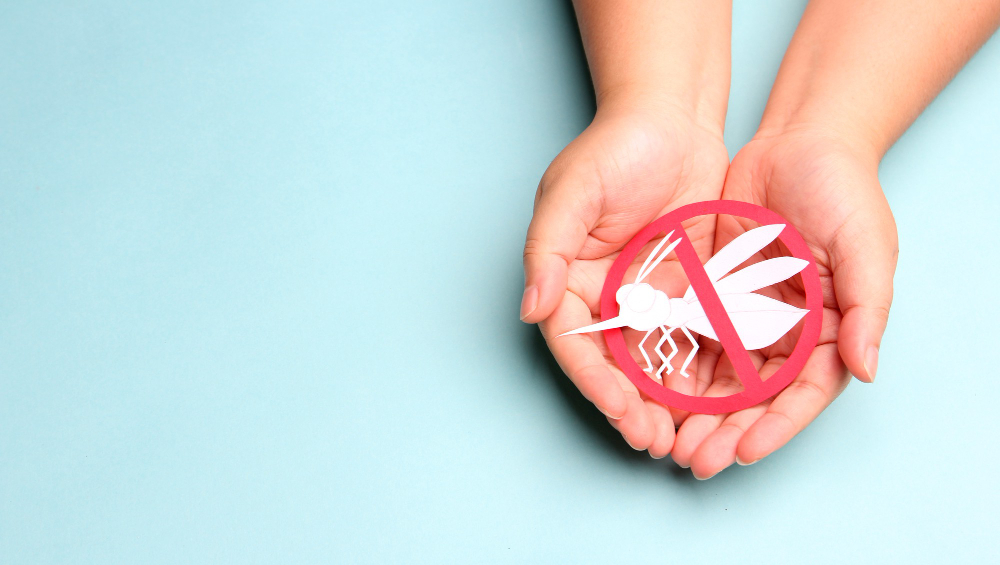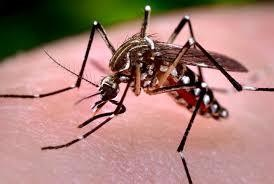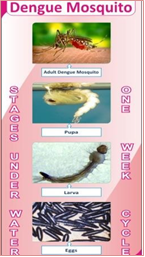Frequently Asked Questions (FAQ) Related To Dengue
1. What is Dengue and how Dengue spreads?
- Dengue is an outbreak prone seasonal viral disease, transmitted through bites of female adult Aedes mosquitoes.
2. How does the Aedes mosquito look like? 
- These are small blackish mosquitoes with white stripes on abdomen & legs.
- These are also called tiger mosquitoes.
3. How many species of Aedes mosquitoes are involved in Dengue transmission?
- Aedes aegypti & Aedes albopictus
4. Where Aedes mosquitoes breed?
- Aedes mosquitoes breed in stagnant water within and around houses.
- Aedes mosquitoes are container breeder viz., cement tanks, overhead tanks, underground tanks, tyres, desert coolers, pitchers, discarded containers, junk materials, potholes, rooftop, window parapet, ornamental fountain, lucky bamboo pot, money plant bottle etc, in which water stagnates for more than a week.
5. Does the Aedes breed in dirty polluted water & drains?
- No, they breed only in clean water.
6. Can Aedes lay egg in stagnant water like in overhead tank etc.?
- Yes
7. What are the risk factors?
- Dengue is associated with water supply, sanitation and solid waste management. The risk of dengue has shown an increase in recent years due to rapid urbanization, life style changes, industrialization and deficient water supply areas leading to improper water storage practices.
8. How long eggs of Aedes takes to become adult Mosquito?
- Dengue vector takes one week to become adult from egg.
9. What are the different stages of Dengue Mosquito in life cycles?
- Egg, larva, pupa, adult.
- Eggs are laid in water.
- Larval and pupal stages are aquatic.
- Adult mosquitoes are only terrestrial/ aerial
10. What is the average life span of an adult Aedes?
- The life span for adult mosquitoes is around three weeks.
11. Where does Dengue vector rest?
- Dengue vector mosquitoes rest in indoor houses mainly in corners under furniture, beds, shelves, almirah and dark clothing hanging inside.
12. When does Dengue vector bite?
- Dengue vector mosquitoes bite during day time usually in morning (8-10 am) & afternoon (3-5 pm) hours.
13. What are the preferred host for Aedes mosquitoes?
- Human being
14. How long Dengue vector can go for feeding / breeding / egg lying (Flight range)?
- Usually adult female of Aedes aegypti is limited within 100 meters (Source WHO Regional Publication SEARO No 29 –Prevention and Control of Dengue and DHF Comprehensive Guidelines Page 51)
15. Does mosquito has preference for site on host during bite?
- Yes – Legs, Hand, Face, Neck, Ears. However mosquito can bite any exposed body parts.
16. What are the Vector control methods?
Vector control/management includes:
- Environmental management for Source Reduction
- Biological Control: Larvivorous fish , Gambusia and Guppy are recommended for control of Ae. aegypti in large water bodies or large water containers.
- Chemical control
- Larval control
- Temephos as chemical larvicide
- Diflubenzuron and Pyreproxifen as Insect Growth Regulator
- Adult control
- Pyrethrum space spray is used in indoor situations as space spray
- Malathion fogging is used outdoor using insecticide Malathion technical
- Cyphenothrin 5% EC– another molecule is also recommended in the programme for fogging which can be used both for indoor and outdoor fogging.
- Larval control
- Personal protection
- Protective clothing
- Repellents as household insecticide products, namely, mosquito coils, mats etc
- Aerosols against mosquitoes
- Insecticide treated mosquito nets or long lasting insecticidal nets (LLIN) to protect infants and night workers while sleeping in
17. How effective fogging is?
Fogging kills the mosquitoes coming in contact with fog. It is not recommended as routine vector control measure. Fogging should be last option due to limitations:
- Temporary stay of fog in environment with no residual effect
- Effect primarily on adult mosquitoes coming in contact of fog
- Repeated application needed
- Effect on vectors dependent on climatic factors like wind velocity and its direction, humidity, temperature
- Speed of the movement of fogger carrying vehicle or spray men
- Dispersal of fog
- Quality of fogging equipment
- High costs
- Mosquito rests indoor, outdoor fog hardly reach indoor
18. What individuals have to do for Aedes control?
- Protecting from mosquito bites
- Long – sleeved clothing and mosquito repellents.
- Window & door screening and
- Using mosquito nets (insecticide-treated nets/LLIN)
- Using household insecticides aerosols, mosquito coils or other insecticide vaporizer.
19. What are important messages for Dengue prevention?
- Covering all water holding containers & tanks with tight lids
- Emptying, cleaning by scrubbing and drying water coolers at least once a week before refilling.
- Disposing & destroying all unused containers, junk materials, tyres, coconuts shells etc.
- Wearing full sleeved clothing, using mosquito nets (day time) & repellants.
Visit or Book a Dengue test at Helix Pathlabs if you have fever, headache, bone and muscle discomfort or low platelet on complete blood count.
Source of above literature – National Centre for Vector Borne Disease control, DGHS, MOHFW, GOI website.
Meet Our MD, Dr. Charandeep Singh Sahni
We take pride in the fact that we are led and driven by the innovative and humanitarian approach of our honourable managing director, Dr Charandeep Singh Sahni. Carrying several years of experience in medical services under his belt, Dr Sahni has been actively involved in organizing and conducting national and state-level conferences at TMH. He specializes in lymph node pathology, GI pathology, head and neck pathology, and breast pathology.
Medical Academic Background and Career at a Glance
- MBBS from the prestigious Grant Medical College and Sir JJ Hospital, Mumbai with distinction in Biochemistry and Pharmacology in 2000.
- MD in pathology from Tata Memorial Hospital, Mumbai from 2003-06.
- Worked as Senior Resident in Department of Histopathology at PGIMER, Chandigarh.
Research and Papers Presented by Dr Sahni
Dr Sahni also demonstrated his professional achievements by presenting his research works at several eminent conferences. Some of his research work was published and referred by eminent medical journals.
- He presented a poster on “Aorto-Left Atrial Fistula” in APCON 2003 at Bhubaneswar.
- His paper on “Analysis of Renal Cell Carcinoma: A Study of 173 cases” in APCON 2005 at Pune was lauded by the healthcare community.
- In 2006, he demonstrated an important piece of research titled “Distribution, clinicopathological characteristics and immunophenotyping of Hodgkin’s Lymphoma: A study of 313 cases using WHO classification (2000)” at APCON 2006 in Bangalore.
Key Published Works:
Dr Sahni has also been involved with many articles published by leading science and medical journals.
- Bothra R, Pai PS, Chaturvedi P, Majeed TA, Singh C, Gujral S, Kane SV. Follicular dendritic cell tumour of tonsil – is it an underdiagnosed entity? Indian J Cancer 2005; 42 (4): 211-4.
- Charandeep S Sahni, Sangeeta B. Desai. Distribution and Clinicopathological characteristics of non- Hodgkin’s lymphoma in India: A study of 935 cases using the WHO classification of lymphoid neoplasms (2000). Leukaemia and Lymphoma 2007; 48 (1): 122-133.
- Charandeep Sahni, Sangeeta Desai. Primary testicular precursor B-lymphoblastic lymphoma: A rare entity. Leukaemia and Lymphoma 2007




